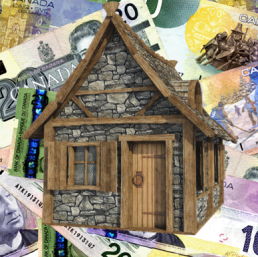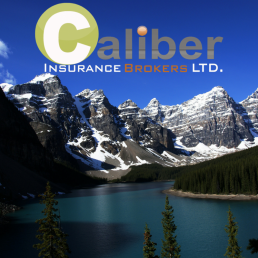9 Ways to Save Money on Your Home Insurance
As claims keep going up, so do your home insurance premiums. You can read all about it in our blog post. But is there anything you can do to keep your premiums as low as possible?
Fear not! Here's 9 ways you can save money on your property insurance premiums:
1 - Get a monitored alarm
Professionally monitored alarms are a great way to reduce the risk of theft, fire or water damage. Companies like Sentry and Vivent have alarm systems that can monitor for low temperature, forced entry, fire or water leaks. Insurance companies give the best discount when you have water sensors.
2 - Need a new hot water tank? Go tankless
Hot water tanks normally need to be replaced every 10 years or so. If you’re due for a new tank, think about getting a tankless system. Rather than have a big 40-gallon tube of hot water in your basement, you have a box that goes on the wall. It generates how water on demand, which means the risk of the tank bursting is gone. They’re more expensive, for sure – but a tankless system can save you around $200 a year on your home premium!
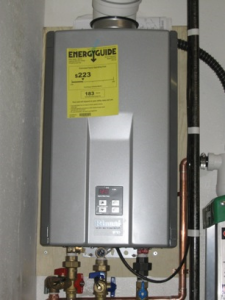
3 - Need a new roof? Get Class 4 shingles
If you have an asphalt shingle roof, you need to replace it every 15-20 years. Asphalt shingles are now rated from Class 1 to Class 4. Class 4 shingles are considered hail-resistant and insurance companies give you a nice discount when you have them. If you need a new roof, ask the roofing company for a price on Class 4 hail-resistant shingles.
4 - Doing basement renovations? Get a backwater valve installed
In Edmonton, homes built since the early 1990’s have a backwater valve. It helps prevent a sewer back up during a heavy rainstorm or Spring melting. If your home was built before 1990, chances are it doesn’t have this simple device. If you are doing basement renovations, you’ll have to knock out some concrete to get at the pipe and have one installed. When you do, let your insurance broker know!
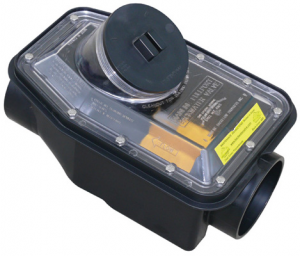
5 - Install a Water Flow Device
Intact Insurance now offers a discount when you have a water flow device installed. What’s a water flow device, you ask? It’s a gadget that’s installed on your home’s main water line after the water meter. It monitors a plumping pipes, fittings and appliances for abnormal water flow. If anything is detected, the water is turned off automatically.
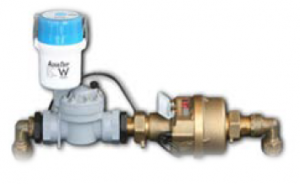
6 - Increase your deductible
If you’ve been with the same insurance company for a long time, you still might have a low deductible of $500. A deductible is the amount you pay when there’s a claim. When it comes to home insurance, you want to avoid putting in small claims. Ask your broker to quote your policy with a $1,000 deductible. It will save you money!
7 - Credit consent
Insurance companies now take your credit score into account when quoting. Make sure you give your broker consent to let the insurance company pull your credit history – it can save you a few hundred dollars on your premium! If your credit is good, you will save money. If it isn’t, they won’t count it against you and charge you more.
8 - Avoid small claims
If you have 2 or more claims in 5 years, insurance companies start to really raise your premiums. If we get a bad hailstorm or sewer back up, there’s not much you can do about it – you will have to make a claim. But, if you have some small wind damage and the cost isn’t too high, consider paying for the repairs yourself.
I’ve seen people put in small claims and then something really big happened. Their premiums went up a lot. In some cases, the insurance company declined to renew their coverage! When it comes to claims, pick your battles and get advice from your insurance broker.
9 - Combine your home and auto insurance
If you have auto insurance, you can save a good chunk of money when you combine your home insurance. If there’s ever a claim on both, sometimes you’ll only need to pay 1 deductible. Some companies will even throw in great freebies like free Accident Forgiveness!
[ninja_form id=5]
Moving to Alberta? Here's the best way to save a bundle on car insurance
If you are new to Alberta and you were driving in your home province, state or country - learn how to get the lowest rate available.
Driving History and Insurance History
In Alberta, insurance companies set your rate based on a few things:
- When you were first licensed
- Convictions in the last 3 years
- Suspensions in the last 6 years
- Claims in the last 8-10 years
When you are first licensed and insured in Alberta, we get this information from 2 places:
- Your driver's abstract, also referred to as a Motor Vehicle Report (MVR)
- Your insurance history, which is kept by Autoplus. You can check out Autoplus here
Why Does This Matter?
Maybe you've been driving for years before moving to Alberta with a clean record - no claims or speeding tickets. You're a good driver: so why is the insurance company quoting you such a high premium?
They just can't take your word for it - they need some documentation. They need proof.
If you have 9 years of clean driving, you'll pay a much lower rate than if you have 2 years. Calling the "cheapest" company won't help if they don't give you any credit for those 9 years. The difference between 9 years and 2 years can be over $1,000 a year!
Getting a copy of your driver's abstract and claims experience letter might seem like a hassle, but it could save you a bundle.
Your Driver's Abstract and Claims Experience Letter
Insurance companies need 2 things from you:
- Your driver's abstract, also referred to as a Motor Vehicle Report (MVR). It's issued by the province, state or licensing authority. It lists when you were first licensed and if you've had any convictions or suspensions. Most licensing authorities have a website and the order form. Below you'll see the links to some of them. You'll need to know your driver's license number and they'll ask you some personal information. Expect to pay about $15 to get a copy.
- A claims experience letter from the insurance company. It needs to be on company letterhead and will show when you were added and removed from the policy. It should list all claims and whether you were at-fault or not at-fault.
To get a copy of your claims experience letter, the insurance company needs your policy number. Keep that number! You should always keep a copy of old insurance policies with the number. They won't charge you a fee for this report.
If you've had insurance from a few companies, you'll need letters from all of them. We need to figure out if you've had continuous insurance history - or if you've had a gap.
Not All Insurance Companies are the Same
- All companies will take history from the Canadian provinces
- Most will take history from the United States
- A few will take history from all other countries
If you're moving to Alberta from outside Canada or the US, get a quote from a company that recognizes your history. All of the companies we deal with will count it!
Moving from Ontario or the Maritimes
If you're moving to Alberta from these provinces, you're in luck - we do things the same way. Keep your driver's license number. We'll need it to pull your Autoplus report. For your driver's abstract, here are the links:
- Ontario https://www.ontario.ca/page/order-drivers-record
- Nova Scotia https://novascotia.ca/sns/rmv/licence/abstracts.asp
- New Brunswick http://www2.gnb.ca/content/gnb/en/services/services_renderer.200564.Driver_Records.html
- Prince Edward Island http://www.gov.pe.ca/photos/original/tpw_dr_abstract.pdf
- Newfoundland http://www.servicenl.gov.nl.ca/drivers/DriversandVehicles/driverlicensing/abstract.html
You might have to pay $15 or so - but you'll only need to do this once. The abstract will show convictions in the last 3 years and any suspensions.
Moving from British Columbia, Saskatchewan or Manitoba
These 3 provinces manage your license and your insurance. When you request a copy of your abstract, you'll also get claims experience information on that report.
- British Columbia http://www.icbc.com/driver-licensing/getting-licensed/Pages/Your-driving-record.aspx
- Saskatchewan https://www.sgi.sk.ca/abstract-details
- Manitoba https://www.mpi.mb.ca/en/DL/DL/Records/Pages/drv-records.aspx
Moving from Quebec
Although Quebec works the same way as Alberta, we can't access Quebec Autoplus reports. You'll need to request your abstract from SAAQ and your claims experience letter from your insurance company.
Moving from the United States
If you're moving to Alberta from the US, it works basically the same. You'll request your abstract your state DMV (Department of Motor Vehicles) or the DPS (Department of Public Safety). You'll also need a claims experience letter from your insurance company. Here are a few links:
- Texas https://www.dps.texas.gov/DriverLicense/driverrecords.htm
- Colorado https://www.colorado.gov/pacific/dmv/purchase-motor-vehicle-record-mvr-letter-clearance
- California https://www.dmv.ca.gov/portal/dmv/detail/online/dr
- Virginia https://www.dmv.virginia.gov/general/#records/drive_record.asp
If you google your state with 'drivers abstract', you should be able to find out where to request the report.
For your claims experience letter, you'll need to know what insurance company (or companies) you had and your policy number. Make sure to keep that information!
Moving from All Other Countries
Before you get to Canada, get a copy of your driver's abstract from your local licensing authority. It will need to be in English, or you can have it translated into English.
You'll also need a claims experience letter from the insurance company. Don't forget - it needs to be on company letterhead!
Here are a few countries that have driver abstracts:
- United Kingdom https://www.gov.uk/view-driving-licence
- Australia - New South Wales https://www.service.nsw.gov.au/transaction/request-driving-record
- Hong Kong https://www.police.gov.hk/ppp_en/05_traffic_matters/tcr.html
- Germany https://www.kba.de/EN/ZentraleRegister_en/FAER_en/Auskunft_en/faer_auskunft_node_en.html
How Far Back Do You Need to Go?
Some insurance companies look at the past 6, 8 or even 9 years. You don't need history from 1985, but back to 2007 is enough to get the best rate possible.
In Alberta, we also use something called the grid. We use your abstract and claims experience to figure out your grid rating and the best is -15. This can be very important if you have an accident later on and it was your fault.
A little work can save you a lot of money
In my experience as an insurance broker, I get calls from people who have been driving for years in another province or country, but they are paying way too much. This wasn't explained to them, or they didn't know that it could make such a big difference.
It is a bit of work, but to save $1,000 a year on your insurance for the next 6 years really adds up!

